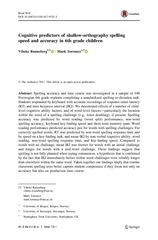Cognitive predictors of shallow-orthography spelling speed and accuracy in 6th grade children
Peer reviewed, Journal article
Published version

Åpne
Permanent lenke
https://hdl.handle.net/1956/17691Utgivelsesdato
2017Metadata
Vis full innførselSamlinger
Originalversjon
https://doi.org/10.1007/s11145-017-9751-3Sammendrag
Spelling accuracy and time course was investigated in a sample of 100 Norwegian 6th grade students completing a standardized spelling-to-dictation task. Students responded by keyboard with accurate recordings of response-onset latency (RT) and inter-keypress interval (IKI). We determined effects of a number of child-level cognitive ability factors, and of word-level factors—particularly the location within the word of a spelling challenge (e.g., letter doubling), if present. Spelling accuracy was predicted by word reading (word split) performance, non-word spelling accuracy, keyboard key-finding speed and short-term memory span. Word reading performance predicted accuracy just for words with spelling challenges. For correctly spelled words, RT was predicted by non-word spelling response time and by speed on a key-finding task, and mean IKI by non-verbal cognitive ability, word reading, non-word spelling response time, and key-finding speed. Compared to words with no challenge, mean IKI was shorter for words with an initial challenge and longer for words with a mid-word challenge. These findings suggest that spelling is not fully planned when typing commences, a hypothesis that is confirmed by the fact that IKI immediately before within word challenges were reliably longer than elsewhere within the same word. Taken together our findings imply that routine classroom spelling tests better capture student competence if they focus not only on accuracy but also on production time course.
